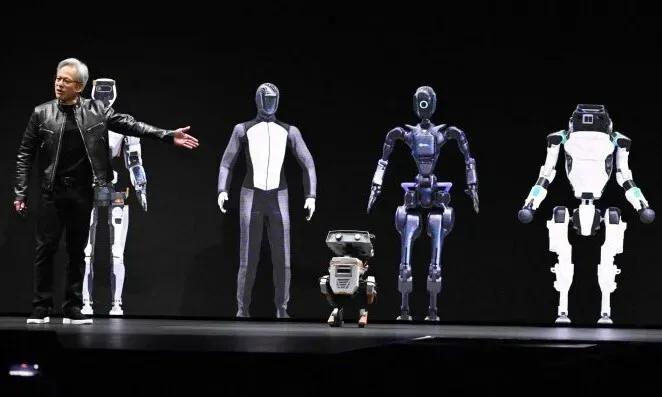Nvidia CEO Jensen Huang speaks about his firm’s robotics at GTC 2024, held in San Jose, California, in March 2024. (AFP/Yonhap)
Nvidia’s pledge to provide South Korea’s authorities and companies with 260,000 of its cutting-edge graphics processing models, or GPUs, has heightened anticipation of the appearance of the so-called bodily AI period.
This large inflow of synthetic intelligence chips could serve to dramatically elevate Korean AI expertise past software-centric AI and into bodily AI territory that entails robots, autonomous automobiles and sensible factories.
On the identical time, this potential catalyst comes with varied challenges, similar to widespread job losses, employment instability and deepening financial inequality.
Bodily AI refers back to the subsequent technology of synthetic intelligence that can be capable to carry out within the bodily world. By understanding the bodily world and its varied legal guidelines of power, gravity and velocity, bodily AI will mimic human beings and make judgments.
If the present generative AI fashions like ChatGPT produce content material by using info floating across the web, bodily AI is nearer to a dynamic system that mixes the foundations of physics and knowledge associated to things and imaginative and prescient to work together with individuals and objects. It’s a expertise that’s one step nearer to the top objective of AI: efficiently mirroring people.
Through the CEO summit on the Asia-Pacific Financial Cooperation discussion board on Oct. 31, Nvidia CEO Jensen Huang mentioned that AI expertise is surpassing mere software program, leaping out into the bodily world into the world of bodily AI. Huang predicted that robotics could have its personal “ChatGPT second” fairly quickly.
Briefly, Huang sees an enormous upheaval within the robotics business on the horizon due to bodily AI, very similar to the generative AI craze triggered by ChatGPT.
Huang took the stage at CES 2025, the world’s greatest tech occasion hosted in Las Vegas in January, with 14 humanoid robots in tow. There, he declared the appearance of an period of “bodily AI.”
Humanoid robots are capturing the eye of many for his or her potential by the applying of bodily AI. The nation main technological advances on this sector is China. Based on MIT Expertise Overview, an internationally acknowledged IT journal, greater than 60 of the 160 international firms specializing in humanoid robots have been primarily based in China.
Numerous firms, together with Xiaomi (recognized for its bipedal robots) and Unitree (with its simply acknowledged robotic canine), make the most of these robots in a myriad of sectors, similar to customer support and within the theater.
Within the US, electrical car firm Tesla, robotics startup Determine AI and Google DeepMind are competing to steer the humanoid robotic business. Optimus, Tesla’s humanoid mannequin introduced in 2021, has human-like limbs, tactile sensors and a fancy imaginative and prescient system, whereas Determine AI’s humanoid mannequin was examined and deployed at a BMW Group Plant in Germany.
Full autonomous driving can also be a objective that may be achieved by bodily AI. The autopilot mode accessible in Tesla automobiles is an help system that kicks into place when an individual has their palms on the steering wheel, which means that it has not but entered the part of full self-driving.

President Lee Jae Myung of South Korea meets with Nvidia CEO Jensen Huang on the sidelines of the APEC summit in Gyeongju on Oct. 31, 2025. (pool picture)
Bodily AI would be capable to accumulate information in actual time to investigate the totally different vehicles, individuals and obstacles on the highway to attain full autonomous driving.
Bodily AI is a sector during which Korea remains to be taking child steps. Bodily AI requires varied sensors to acknowledge huge quantities of data, neural processing models (NPUs) to function the system’s mind, and AI accelerators for fast computation.
Huang’s pledge to provide a lot of GPUs to the Korean authorities and main firms will assist speed up Korea’s makes an attempt to develop bodily AI.
South Korea is a powerhouse on the subject of manufacturing amenities and software program. As Samsung Electronics is able to producing semiconductors throughout all fields, from HBMs to system semiconductors, and Hyundai Motor Group has constantly performed analysis on autonomous driving and the automation of producing, Nvidia might discover no higher allies.
Korea additionally has a powerful manufacturing basis spanning shipbuilding, automotives and varied supplies and elements.
“Compared to the US, which has seen its manufacturing basis collapse, the Korean manufacturing business remains to be going robust. In comparison with European nations that additionally thrive in manufacturing, similar to Germany, Korea has the higher hand in that it makes its personal software program. Based mostly on these causes, Korea is a fertile take a look at mattress for Nvidia,” commented Choi Byeong-ho, a professor at Korea College’s Human-Impressed AI Analysis lab.
Nonetheless, the accelerated push for bodily AI may even include its personal set of challenges associated to job alternatives and deepening financial polarization. In 2024, Morgan Stanley estimated that humanoid robots would have an effect on 40% of American staff and 75% of occupations. Job alternatives will vanish, and solely a handful of giant conglomerates that lead the bodily AI sector will profit from monetary positive factors.
“The transition to bodily AI might present alternatives for the business’s ecosystem, particularly by offering options to environments which might be difficult for human laborers, similar to warehouses,” urged Lee Hae-soo, a senior analyst on the Software program Coverage & Analysis Institute.
“Firms ought to brace themselves for the shift within the labor market by collaborations between massive conglomerates and small and medium-sized enterprises, in addition to the reeducation of laborers,” Lee mentioned.
By Kwon Hyo-jung, workers reporter
Please direct questions or feedback to [english@hani.co.kr]

